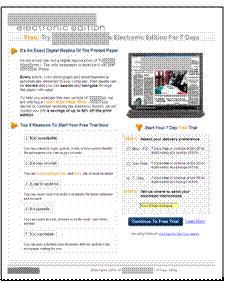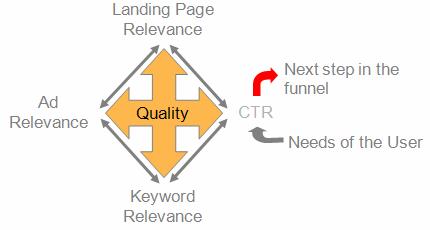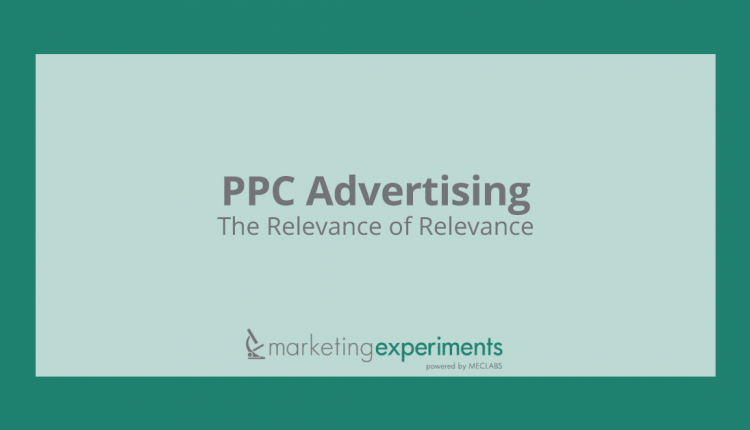How important is PPC relevance and how can you manipulate it to your advantage while maintaining a positive ROI?
Anyone who has set up or managed a paid search campaign can testify that there is an art form involved in realizing the full potential of every advertising dollar.
Part of mastering this art form is understanding the nature and role of relevance in paid search—and more importantly, learning how you can use this understanding to improve the performance of your paid search campaigns.
Editor’s Note: We recently released the audio recording of our clinic on this topic. You can listen to a recording of this clinic here:
Case Study 1
Test Design
We conducted an experiment for The Encyclopædia Britannica, a leading industry subscription-based site.
The goal was to determine the best combination of ad titles and ad copy.
Treatments
For each treatment, the ad copy remained constant; only the ad titles were different.
Control
Encyclopedia Britannica
World Famous 32-volume Encyclopedia
Payment Plan Available, On Sale!
safe1.Britannica.com
[Note: for search purposes, the spelling of “Encyclopedia” did not preserve Britannica’s branded “æ.”]
Treatment 1
Britannica Sets
World Famous 32-volume Encyclopedia
Payment Plan Available, On Sale!
safe1.Britannica.com
Treatment 2
New 2007 Britannica Set
World Famous 32-volume Encyclopedia
Payment Plan Available, On Sale!
safe1.Britannica.com
Search phrases containing the keywords “Britannica” and “Encyclopedia” generated almost 90% of the click volume.
So, which ad title do you think performed the best?
- Encyclopedia Britannica?
- Britannica Sets?
or
- 2007 Britannica Set?
Results
| Ad Title | CTR |
|---|---|
| C – Encyclopedia Britannica | 12.03% |
| T1 – Britannica Sets | 3.03% |
| T2 – New 2007 Britannica Set | 4.87% |
| Difference: Control vs. Trt 2 | 147.02% |
What you need to understand: The ad title that included the word “Encyclopedia” generated 147% more clicks than those that did not, with CTR almost two and a half times that of the next-highest treatment.
Paid Search
Relevance
We know that search engines consider relevance of search terms to ads when making placement decisions.
But is the importance of relevance limited only to ad placement?
First, we must make sure we all understand the term “relevance” in the same way:
Merriam-Webster™ defines relevance as:
- a: relation to the matter at hand
b: practical and especially social applicability - The ability (as of an information retrieval system) to retrieve material that satisfies the needs of the user
Applying these definitions to marketing, relevance logically diverges into two distinct types:
| Relational Relevance | Necessity Relevance |
|---|---|
|
|
What you need to understand: The real battle is not on the Web page, but in the mind of the user. What is he looking for? What does he want?
You may have relational relevance wherein the terms in your headline, the search engine, and the ensuing pages all relate to one another, and you receive favorable ad placement and get click-through. Unless your offer recognizably satisfies the needs of searchers, though, these click-throughs will not translate to conversions.
Necessity relevance is closely tied to motivation, the factor with the highest coefficient in the MECLABS Conversion Index formula.
Case Study 2
Test Design
We conducted an experiment for the publisher of a very large national news publisher. The goal was to increase traffic and consequently subscription sign-ups.
Increasing pay-per-click traffic had proved to be a challenge because the paid search campaign already employed all perceived high-relevance terms.
Broad research question:
Is it possible to buy high traffic keyword phrases that are indirectly related to the product and use them to generate qualified leads for the company’s subscription product? For instance, would it be possible to increase qualified traffic for a site that promotes hybrid cars by using the keyword phrase “global warming”?
Our concern was that although the keyword phrases were related to the ad (through keyword insertion), they might not be relevant to the motivations of those searching using those terms.
For this test, campaigns were developed that bid on news-related keyword phrases, including “World Cup soccer” and “contemporary world events.”
Directly related key terms [The key terms are a representative example of the aggregate campaign. Multiple ad variations were used.]
→ Online Newspaper
→ World Times Online [World Times is a fabricated name to ensure anonymity for the research partner.]
→ World TimesEE
→ Breaking News
→ World Newspaper
The World Times Online
The World Times Electronic Edition
$9.99 a month. Free Trial
www.WorldTimesEE.com
Both the Relational and Necessity Relevance were high.

Indirectly related key terms
→ Lebanon
→ Iran
→ FIFA World Cup
→ FIFA World Cup 2006
→ Zidane
→ Barbaro
{KeyWord: World} News
The World Times Electronic Edition
$9.99 a Month. Free Trial
www.WorldTimesEE.com
This time the Relational Relevance was high, the Necessity Relevance, undetermined.

Landing page relevance
We found that with just the indirectly related key terms, we were able to generate an additional 500,000 impressions.
But would the offer on the landing page be relevant enough to the needs of the searcher to generate conversions?
| Keyword | CTR | Conv |
|---|---|---|
| Indirectly related terms | 2.23% | 0.01% |
| Directly related terms | 1.75% | 0.80% |
| Diff. Unrelated v. Related | 27.43% | -99.38% |
What you need to understand: The indirectly related keyword terms yielded an average CTR of 2.23%. However, the conversion rate decreased from an average of 0.8% for directly related terms to less than 0.01%. So, despite increased CTR, the indirect key terms did NOT drive subscriptions.
Relevance
In order to obtain favorable search ad placement, we must use relational relevance.
However, it is necessity relevance that presents the challenge. Once you garner a click, the page copy MUST satisfy the needs of the user. Write ad copy that goes beyond keywords and gets to the intent and motivation of the searcher.

How can both forms of relevance be combined to maximize the ROI of my paid search investment?
1. Relational relevance.
Design your PPC ads so that they are closely related to your key search terms. The more closely related they are interpreted to be, the better qualified traffic you will receive.
2. Instant Recognition.
Create a clear connection between your PPC ad and the target landing page. Customer prospects should recognize instantly upon arriving on the landing page that the page contains what they are looking for.
If your ad is about “discounts round trampolines,” make your landing page headline about “discounts round trampolines.”
Monitor your competition.
Your competitors’ ad copy can provide key insights about what is working for them. In particular, watch for changes.
How do the major search networks define relevance and how do they differ from one another in using relevance to determine ad placement?
In general, the leading PPC networks use algorithms that evaluate the relationship between keyword, ad copy, bid, and in some cases landing page to determine relevance.
But each handles relevance differently and it is essential to understand these differences when optimizing your paid search campaign for relevance.
AdWords
AdWords raises or lowers Minimum CPC and position based on ad relevance.
In order to calculate ad relevance, Google takes into account historic click-through-rates, ad text, bids, and landing page quality.
Yahoo
Yahoo! uses something akin to historical performance (defined by click-through-rate) and bid amount to calculate ad relevance and help determine ad position.
Ad Relevance = f (historical performance, bid amount)
Unlike Google or MSN, Yahoo! does NOT use landing pages to calculate relevance.
MSN
MSN is very similar to AdWords in that it looks at maximum bid, click-through-rate, and landing page quality.
But MSN goes a little further by considering landing page attributes and detects the presence of key terms on the landing page, whether in the copy or in the code (e.g., meta information, tags).
Paid search marketing focuses on identifying and satisfying the needs and motivations of prospects. Every step of the way, you should be asking yourself the following questions:
- What are people searching for? (Information, products, etc.)
- How are they searching? (Keywords, Engines)
- How does my offer satisfy their specific needs?
- How can I maximize the connection between their motivations and my offer?
- And most importantly, what does the market want that I can deliver better than anyone else?
Related MarketingExperiments Reports:
- Landing Page Optimization—Big Conversion Gains from a Little Scissors and Grease?
- Landing Page Optimization Tested—How to Create “Sticky” Landing Pages
- Online Ad Tested—How Matching Ad Design to Context Improved Conversion by 127%
- Online Testing Certification: Improve Your Online Testing Skills, Increase your Company’s Revenue, and Advance Your Career
- Optimizing Landing Pages
- PPC Ad Copy Tested
- Google Adwords Select Tested—New Insights from Our Sustained Testing of the Google AdWords
- Google AdSense Tested—Learn How to Maximize Your Paid Search (PPC)
As part of our research, we have prepared a review of the best Internet resources on this topic.
Rating System
These sites were rated for usefulness and clarity, but alas, the rating is purely subjective.
* = Decent | ** = Good | *** = Excellent | **** = Indispensable
- Paid Search ****
- The Coming Media Evolution—Relevance, Auctions, and Marketplaces ***
- Improve Ad Relevancy ***
- Interview with Kevin Lee, Search Superstar ***
- Why does AdWords evaluate quality? ***
- Panama’s Relevance Score Causes Pain and Gain ***
- Search Wars Intensify ***
- Ad Relevance Fad **
- Maximising Google SEO and Adsense ad relevance for Xoops **
- Consumers Say: E-Mail Ad Relevance Up in Last Year **
- Google Learning Center **
- Yahoo Redesigns Search Ad System **
- CPC, CPA, or CPM: The Publisher’s View **
- Google AdSense’s New Update: “Better Ad Relevance” & “Smarter Pricing” **
Credits:
Editor(s) — Frank Green
Bob Kemper
Writer(s) — Adam Lapp
Frank Green
Bob Kemper
Contributor(s) — Jeremy Brookins
Jimmy Ellis
Bob Kemper
Flint McGlaughlin
Aaron Rosenthal
HTML Designer — Cliff Rainer
Holly Hicks



